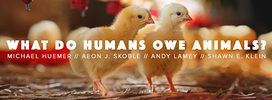As this discussion is about to wrap up, we are finally getting to some of the arguments in defense of meat-eaters. Here is how I understand Shawn Klein’s arguments, with my comments added:
1. Poor people may need to buy factory-farmed meat, because they can’t afford humane products.
Comments:
a. Note that Klein still agrees that “if one can afford humane products, they ought to try to go that way.” Surely the overwhelming majority of readers—including Klein and everyone else in this discussion—can afford humane products (on any reasonable interpretation of that intrinsically unclear idea). Any middle or upper-class person can surely do so. Yet almost all are buying from factory farms anyway. So, once again, I don’t see how Klein can avoid agreeing with me that the overwhelming majority of people are being immoral.
b. I also think almost all “poor” people in America can afford humane products (and I bet that no libertarian would have trouble seeing this point about any similarly priced item, if the item wasn’t meat). America’s “poor” have more money than most people in the rest of the world, and more than most people in previous generations had; they have cars, microwave ovens, air conditioners, and so on.
c. If the price of meat goes up, that doesn’t force people who are eating a lot of meat to suddenly eat none. They would at most reduce their consumption in proportion to the price increase (while still probably leaving that level of consumption much higher than most people in the rest of the world and throughout history). It’s hard to see this as a tragic sacrifice.
2. We can’t all be vegetarians, because the world can’t produce so much vegetables.
Comments:
a. Meat production requires more land, labor, and energy than vegetable production. You have to produce plant foods to feed the animals, then you get less food out than the food you put into raising the animals. If Klein is concerned about world hunger, he should be promoting vegetarianism.
b. Of course, if literally everyone switched to a vegan diet today, that would cause some problems. But that’s a crazy scenario. If you individually become vegetarian, that won’t cause any problems. Nor will there be major problems if the population gradually shifts to vegetarianism (which is the most that could realistically be expected).
3. Meals are part of many important rituals and customs.
Comments:
What’s so great about maintaining customs? Why can’t we change them? If there is some actual benefit obtained by a custom or ritual that involves meals, why can’t that benefit be obtained using a vegetarian meal?
I am not sure what rituals or customs Klein has in mind. In America, I guess the main meat-involving custom is that of eating turkey on Thanksgiving. But why can’t we have a good Thanksgiving dinner with vegetarian food?
4. Humans are more important than animals because they “live within the web of social and moral relationships that constitute society.”
Comments:
a. Suppose you meet a severely autistic person who is unable to form social relationships. Is it then okay to torture and murder that person?
b. Suppose we identify a psychopath, who is unable to understand morality. Is it okay to torture and kill him?
c. Same question for severely mentally disabled people.
d. Same question for a hermit—he doesn’t have any social relationships because he’s chosen to live by himself in the wilderness.
If nonhuman animals have lower moral status due to failing to participate in social relationships, then all of the above people should have similarly lower moral status. So, whatever Klein is saying it’s okay to do to animals, it should be okay to do to those people, for benefits of comparable size.
5. Cruelty is wrong, and we should reduce unnecessary cruelty in food production, but that doesn’t entail that people are acting immorally by eating meat.
Comments:
I don’t understand this point at all.Normally, if X is wrong, then it’s also wrong to pay other people for doing X. So if the meat industry is acting immorally, you shouldn’t pay them for doing it. I don’t see how Klein thinks that most people aren’t being immoral.

